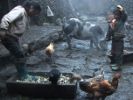Eye For Film >> Movies >> Three Sisters (2012) Film Review
Due to the simple autonomy of its observational footage, it seems redundant and even impossible to take notes on Three Sisters (San Zimei) beyond merely recording events – which in any case director Wang Bing does in abundance. At 153 minutes, the latest work from one of China’s foremost documentarians is a breeze in comparison to previous epics such as the 840-minute Crude Oil (2008), though it does nevertheless risk charges of indulgence. Presumably, the time spent in close proximity with the family depicted herein gave the director a sense of responsibility to depict their everyday experience in as comprehensive a manner as possible. This is in many ways, then, a durational film, whereby length alone becomes a kind of truth.
The three sisters to whom Wang’s film refers are ten-year-old Yingying, six-year-old Zhenzhen and four-year-old Fenfen, who live on the high hills of the Yunnan region in China’s Xiyangtang Province, 32km above sea level and home to just 80 families. Besides spending time with one another, the three siblings are overseen by their aunt Zhu Fulian and their grandfather Xun Zingliang. In one of the film’s early scenes, middle sister Zhenzhen kicks youngest Fenfen; with the latter screaming – for attention as much as in pain – Yingying snaps, “Do you want a hug!?” Their life of hard knocks is firmly established.

Left to their own devices, the three sisters seem to be constantly preparing things: heat for a fire, patches of dung to grow potatoes. Yingying especially is for all other purposes an adult before her time, playing guardian to her younger siblings: drying their shoes at the end of a long day on the hills, or seeing to their bleeding feet, or searching for lice in their hair (“My god, you’re crawling with lice!”). Forty-five minutes of screen-time into this routine, the girls’ father, Sun Shunbao, returns from the city to take the younger two away with him; Yingying is left with her grandfather, who promises to pay her 50 cents a day for her work. The film’s middle segment is an almost wordless document of child labour, foregrounding the physicality of Yingying and her cousins’ efforts on the hills without the need for sensationalism.
Against the backdrop of such a remote terrain, Yingying’s life is one of solitude, the soundtrack of her daily routine being, in cinematic terms at least, that harsh abrasion of wind battering microphones. Even those scenes in which she stands with fellow children outside the local elementary school suggest unspoken curiosities and a fragile confidence. Seeing her among others, one might feel a strange sense of responsibility for the child, having grown more involved in her life as the film has developed; likewise, one might also sense some kind of order restored when, later in the film, Sun Shunbao returns home indefinitely and his family sit down to enjoy bowls of steamed noodles.
Wang is matter-of-fact in his presentation of these quiet dramas. Given the remarkable intimacy with which he is able to capture his subjects, it’s perhaps surprising that he makes so little effort to romanticise their community. He keeps his camera running, for example, as six-year-old neighbour Jiaojiao obstructs Yingying’s path home due to an ongoing petty quarrel. Any clichés about rural resilience (referred to by the local mayor as “rural revival”) are thoroughly denied. And the economic problems facing rural China couldn’t be more apparent.
Reviewed on: 23 Jun 2013
















